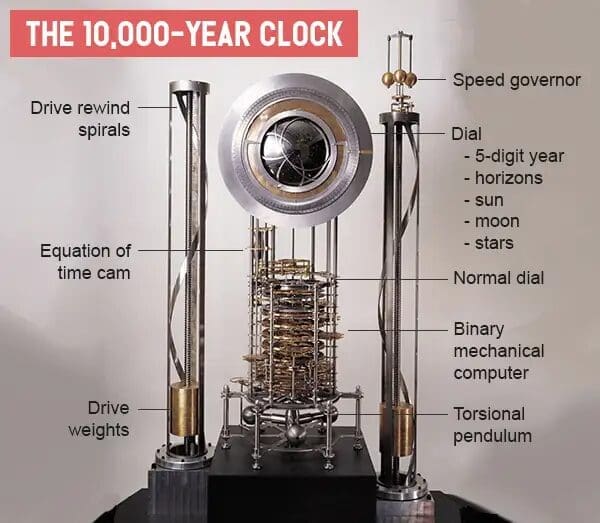

Definition
The branch of applied ethics that deals with moral principles and values related to long-term planning, decision-making, and the potential consequences of current actions on future generations and scenarios.
Example
Long Now
The development of the Long Now Foundation’s 10,000 Year Clock project, initiated by Danny Hillis in 1986, embodies futures ethics. This massive mechanical clock, designed to run for ten millennia, encourages long-term thinking and responsibility towards future generations.


Ask yourself
- What moral obligations do we have to potential future scenarios or beings?
- How do we balance short-term needs with long-term ethical considerations?
- What ethical frameworks are most appropriate for evaluating future outcomes?
- What are the potential long-term consequences of our current decisions?
Tools
- Scenario Planning: Exploring various future outcomes to assess ethical implications
- Futures Wheel: Mapping out potential consequences of decisions
- Causal Layered Analysis: Examining deeper cultural and systemic ethical issues
- Backcasting: Working backwards from desired ethical futures
- Ethical Impact Assessment: Evaluating the potential ethical outcomes of policies or technologies
Emerging Ethical Considerations for the Future
- Artificial Intelligence Ethics
- Rights and personhood for AI entities
- Accountability for AI decision-making
- AI bias and fairness in algorithmic systems
- Genetic Engineering and Human Enhancement
- Designer babies and genetic modification
- Cognitive enhancement and its societal impacts
- Lifespan extension and resource allocation
- Environmental Ethics
- Rights of nature and non-human entities
- Geoengineering and climate intervention ethics
- Interplanetary contamination in space exploration
- Digital Privacy and Surveillance
- Data ownership and digital legacy
- Neuroimaging and thought privacy
- Ubiquitous surveillance and freedom
- Autonomous Systems
- Self-driving vehicles and accident responsibility
- Autonomous weapons and warfare ethics
- Robotic caregivers and human interaction
- Virtual and Augmented Reality
- Identity and behaviour in virtual worlds
- Addiction to immersive experiences
- Reality manipulation and perception alteration
- Neurotechnology
- Brain-computer interfaces and mental privacy
- Memory manipulation and identity
- Cognitive liberty and thought crime
- Space Exploration and Colonisation
- Extraterrestrial resource rights
- Planetary protection and alien life
- Governance of space settlements
- Nanotechnology
- Molecular manufacturing and economic disruption
- Nanobot swarms and control issues
- Human-machine integration at the cellular level
- Quantum Computing
- Cryptography and privacy implications
- Simulation ethics and reality questioning
- Quantum advantage and societal inequality
- Biotechnology and Synthetic Biology
- Creation of novel life forms
- Biosecurity and dual-use research
- Human-animal chimaeras and moral status
- Post-Scarcity Economics
- Universal basic income and purpose
- Ownership in an age of replicators
- Motivation and meaning in a workless society




